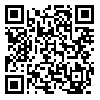BibTeX | RIS | EndNote | Medlars | ProCite | Reference Manager | RefWorks
Send citation to:
URL: http://ijpcp.iums.ac.ir/article-1-1513-en.html
2- Shahid Chamran University
Objectives: The purpose of the present study was to examine the reliability and validity of the Sexual Self-Efficacy Scale-Erectile Functioning (SSES-E) among university students. Method: 115 married male students of Shahid Beheshti University, Tehran, Iran, were selected voluntarily, and completed the SSES-E. Results: The alpha chronbakh coefficient was calculated as α= 0.95 and for the five factors extracted, it was 0.82 to 0.91. Also, exploratory factor analysis using varimax rotation and with eagenvalues more than one, extracted five factors (having intercourse without fear or anxiety, keeping an erection during the intercourse, get a sexual encounter, reach to orgasm, and re-sexual desire) which explained 74.04% of the items variances. There was significant correlation between total score and five extracted factors. Furthermore, there was high sexual self-efficacy among 20 males and low sexual self-efficacy among 17 males. Conclusion: The clinical psychologists and family councelors can use and benefit the SSES-E to identify the male clients with erectile difficulties for training and treatment activities in clinical and counceling settings.
Received: 2012/07/9 | Published: 2012/07/15
| Rights and permissions | |
 |
This work is licensed under a Creative Commons Attribution-NonCommercial 4.0 International License. |



